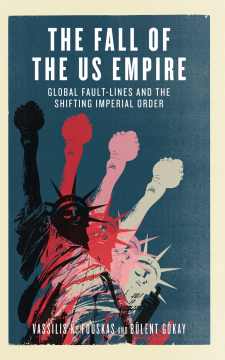
Additional Information
Book Details
Abstract
Despite Washington's military supremacy, its economic foundations have been weakening since the Vietnam war – accelerated by the great recession and credit-rating downgrade – and its global authority dented by the quagmires in Iraq and Afghanistan.
This book intervenes in the debates surrounding America's status as an empire. It analyses Immanuel Wallerstein and others who argue that the US is in decline, to those who maintain that it remains a robust superpower. By explaining how America's neo-imperial system of governance has been working since WWII, it links the US's domestic and foreign vulnerabilities.
The Fall of the US Empire argues that the time has come to understand the US empire not by its power but by its systemic vulnerabilities of financialisation, resource depletion and environmental degradation.
'The authors display an impressive mastery of the relevant theoretical literature without ignoring the factual details of the current financial and economic crisis'
Ben Fowkes
'A major addition to the literature on the decline of US hegemony'
Donald Sassoon, Professor of Comparative European History, Queen Mary University of London
'This absorbing book makes a remarkable contribution to the current version of this very important debate, while revisiting its previous versions ... stimulating reading'
Gilbert Achcar, Professor of Development Studies and International Relations at the School of Oriental and African Studies (SOAS) of the University of London
'Ambitious... offers an historically informed alternative to mainstream readings of the crisis'
Engelbert Stockhammer, Professor of Economics, Kingston University
'Stimulating and challenging'
Mike Newman, Emeritus Professor of Politics and Jean Monnet Professor of European Studies, London Metropolitan University
'A coherent and theoretically informed account of the changing balance of global power'
Professor Costas Lapavitsas, SOAS, University of London
Table of Contents
| Section Title | Page | Action | Price |
|---|---|---|---|
| Cover | Cover | ||
| Contents | vii | ||
| Acknowledgements | ix | ||
| Abbreviations | xii | ||
| Introduction | xv | ||
| Box: a definition of global fault-lines | xviii | ||
| 1. Global fault-lines | 1 | ||
| Preliminary observations | 1 | ||
| Beyond conventional wisdom | 9 | ||
| Marxisant discourses on the financial crisis | 14 | ||
| The tragedy of globalization: the end of the ‘Long Twentieth Century’? | 25 | ||
| 2. From Bretton Woodsto the abyss ofglobalization, 1944–71 | 33 | ||
| Background to Bretton Woods | 33 | ||
| The US empire-state responds to the Great Slump | 38 | ||
| Determinants of the rise and fall of the ‘Golden Age’ | 43 | ||
| 3. The failure of financial statecraft (1), 1971–91 | 57 | ||
| A note on Ernest Mandel | 57 | ||
| Business strategies dealing with stagflation | 61 | ||
| An unstable ‘petrodollar’/‘weapon-dollar’ regime | 65 | ||
| 4. The failure of financial statecraft (2), 1991–2011 | 77 | ||
| Towards a periodization of imperial orders | 77 | ||
| The explosion of financialization and how it undermined growth | 83 | ||
| The internationalization of the US Treasury | 87 | ||
| The implosion of financialization and the case of the United Kingdom | 96 | ||
| 5. The power shift to the global East | 111 | ||
| Issues between the United States and China | 113 | ||
| The growth of emerging economies | 114 | ||
| Control over resources | 117 | ||
| The growing consumer classes | 119 | ||
| Brazil’s experience | 121 | ||
| Projected results of the shift in economic power | 125 | ||
| Analysis and interpretation | 129 | ||
| 6. Resource depletion and environmental degradation | 133 | ||
| Oil | 134 | ||
| Oil scarcity and its impact | 137 | ||
| The environment in crisis | 138 | ||
| Responses to environmental challenges | 140 | ||
| Conclusion | 142 | ||
| Summing up the argument | 142 | ||
| Prospects for the future | 145 | ||
| Notes | 153 | ||
| References | 176 | ||
| Websites | 188 | ||
| Index | 189 |
